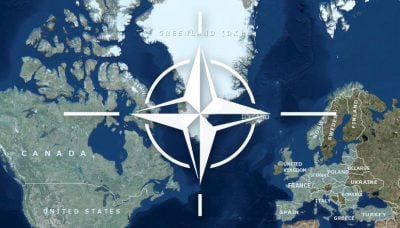“We seek lasting peace while NATO prepares for perpetual war.”
A statement from the Progressive International Cabinet at the close of the the NATO Summit in Madrid.

All Global Research articles can be read in 51 languages by activating the “Translate Website” drop down menu on the top banner of our home page (Desktop version).
To receive Global Research’s Daily Newsletter (selected articles), click here.
Visit and follow us on Instagram, Twitter and Facebook. Feel free to repost and share widely Global Research articles.
***
Over years and decades, NATO’s mandate has stretched to accommodate the expansionist ambitions of its founders. NATO formed in 1949 with the mission of “deterring Soviet expansionism, forbidding the revival of nationalist militarism in Europe through a strong North American presence on the continent.” When the Warsaw Pact dissolved in 1991, NATO did not disband, but rather US strategy resolved to prevent “the re-emergence of a new rival, either on the territory of the former Soviet Union or elsewhere.”
Its 2001 invasion of Afghanistan, an “out of area” military operation that lasted 20 years, killed hundreds of thousands of civilians and forced millions to flee their homes. That war left a legacy of profound poverty, hunger, displacement, and instability in its wake. According to the United Nations, Afghanistan now faces “universal poverty” amid a total collapse of its developmental and humanitarian capacities.
NATO’s war in Libya saw open-air slave markets reappear in a nation that once boasted Africa’s highest Human Development Index. That destruction poured fuel on the fire of militancy and conflict in the nearby states of Mali, Algeria and Niger. This proliferation of violence has seen NATO move further afield through formations like the African Standby Force.
Today, NATO arms and trains forces in Morocco, sustaining not only its violent occupation of Western Sahara, but also securing its role as the lynchpin of European border security. On 25 June 2022, Moroccan security forces massacred dozens of refugees as they sought to enter the Spanish enclave of Melilla. Under NATO’s supervision, Europe’s externalised borders have become weapons against those who seek refuge.
NATO’s expansion has also provided a blanket of impunity for member-state Turkey. With generous political and material support from the United States and other NATO countries, the government of Recep Tayyip Erdoğan has repeatedly violated international law in his assault against the Kurdish people. Now, Turkey is launching new military offensives at its borders — to silence or tacit approval from its NATO partners.
NATO gathered this week under the auspices of responding to Russia’s violent escalation of the war in Ukraine. But its ambitions reach further than regional defence. At the Madrid Summit, it named China as a long-term threat, promising to deepen cooperation with countries like Australia, Japan, New Zealand and the Republic of Korea, the latter of which appeared at the NATO Summit for the first time in history — a clear pivot of the military alliance from the Atlantic to the Pacific. The vision of “Global NATO”, first articulated in 2006, is fast becoming a grim reality for billions of people for whom the costs of war are carved from the imperatives of survival.
NATO policies not only devastate those they maim or kill. They also inflame crises of climate, health, and hunger. For the first time in history, the world spent over $2 trillion on weapons in 2021, with the United States accounting for 40% of the total. In Europe alone, NATO has now committed to increasing its rapid response force nearly eightfold — to 300,000 troops.
Meanwhile, the world teeters on the brink of famine — and even citizens in Europe and the US face a winter of hunger as military and economic escalation take their toll. Weapons of war cannot fill empty stomachs. They cannot heat homes. They cannot repair a dying planet. And they cannot end pandemics.
Countries across the planet recognise the peril of a new Cold War. Nobody dares to envision the implications of a direct NATO confrontation with Russia and China. But a new Cold War also threatens to turn third nations into sites of indirect proxy conflict, creating new ‘sacrifice zones’ in the name of security for those who are last to bear the brunt of war.
Lasting peace can only be won by a common security framework that does not allow for the domination of one country by another, or one bloc over any other — but rather succeeds to demilitarise the planet, fight its poverty, and pool common resources to secure social and environmental justice. In standing against these existential priorities, NATO has revealed a preference for domination over the imperative of our survival.
*
Note to readers: Please click the share buttons above or below. Follow us on Instagram, Twitter and Facebook. Feel free to repost and share widely Global Research articles.
Featured image is from InfoBrics

